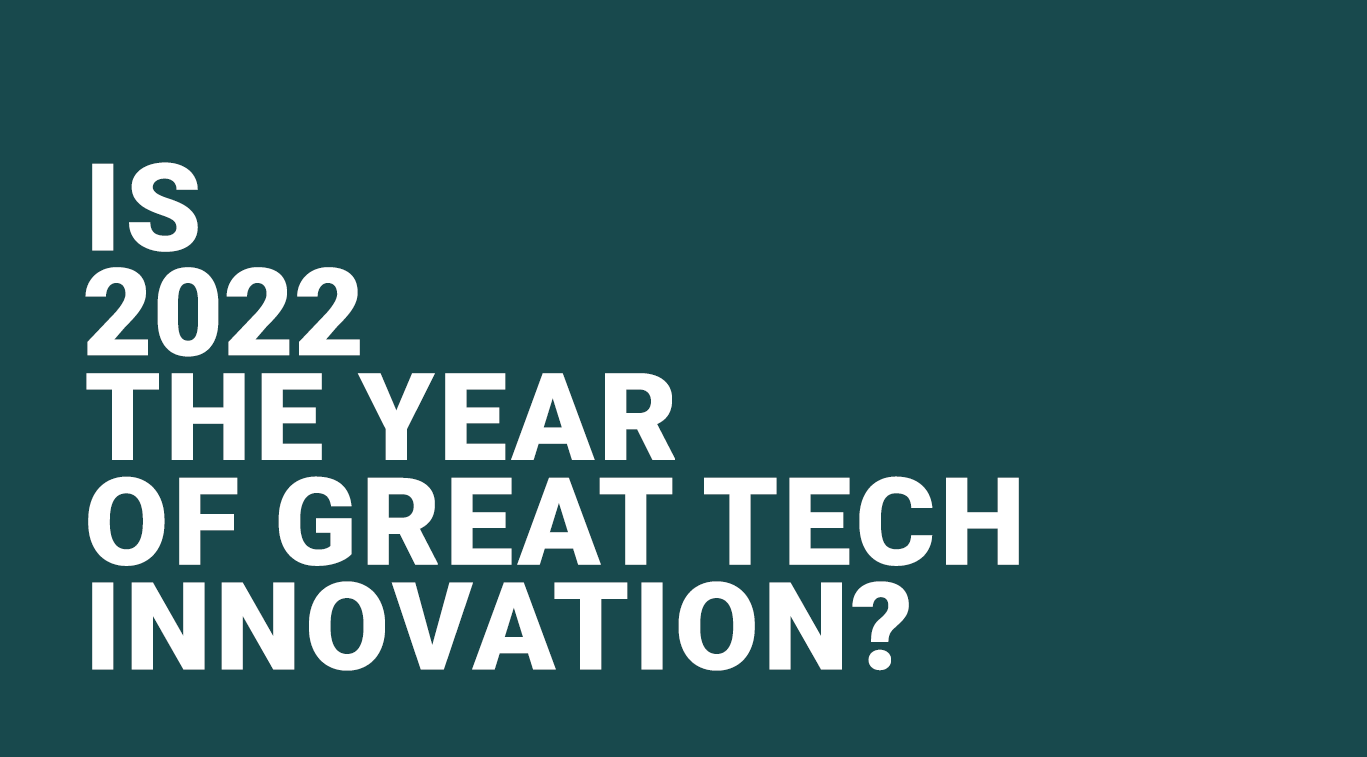Is 2022 the year of great tech innovation?

Written by Shrisha Sapkota
Blogger

Introduction:
We live on a rising tide of technology – a time of increasing tech intensity, in the words of Microsoft CEO Satya Nadella, when an organisation’s development will increasingly be linked to its tech adoption rate and tech capability.[1] Technology projects innovation to all the industries and it is hard to resist. In law, tech touches almost every aspect of the legal processes lawyers undertake day after day. It makes contract drafting easier and more bearable, makes time management the simplest thing, and measures work hours without effort.[2] The past two years have seen major changes that no one could have predicted, as Covid-19 forced courts to suspend in-person operations and companies to rapidly transition to remote workforces.[3] After a massive shift in 2020 and 2021 to working and conducting court proceedings remotely, with the help of many remote technologies, many legal professionals may wonder what lies ahead from a technology standpoint.[4]
A new year holds exciting opportunities, warranted improvements, and unanticipated challenges that are waiting to be solved with innovative ideas – there will be ups, there will be downs, and there will be trends.[5] This year is going to be the year of Transforming Human Interactions. The latest innovations will have an enormous impact on the industry and consumers and require robust broadband networks.[6]
Even the simplest of changes, such as law firms switching entirely to digital signatures rather than classic ballpoint, is a sign of the accelerated adoption of technology.[7] However, this has only just begun. The technology trends of 2022 are loaded with “old acquaintances” that are evolving and the latest advances that will further transform a lawyer’s work and how they interact with their clients.[8] Since legal practitioners could see how much technology helps them to execute their work, they can look forward to what’s next.[9]
What is Legal Technology?
The legal industry is traditionally risk-averse and remains so to this day. It has been very slow to adopt technology solutions. Numbers have increased more recently, and legal tech has been gaining traction, especially as the Covid-19 pandemic has made it difficult to access legal services.[13] While in previous periods of economic uncertainty, businesses have held back on new investments – the disruption caused by Covid-19 may be having the opposite effect. Some of these investments are essential, such as rapidly transforming an office-based workforce into a remote one, often with very short notice.[14] A bigger number of companies will use legal tech tools for work automation.[15]
Some of the biggest tech innovations to look out for in 2022 are discussed below.
Automation and Hyper-Automation:
Hyper Automation is the concept of automating everything in an organisation that can be automated.[16] Hyper-automation is the extension of legacy business process automation beyond the confines of individual processes. By marrying AI tools with RPA, hyper-automation enables automation for virtually any repetitive task executed by business users.[17]
Formerly a paper document-heavy business, law firms now want every part of the legal process digitised and automated. The digitization of these services will only become more imperative as remote work continues indefinitely, and there is a positive aspect to a potentially heavy lift: the 2021 Gartner report estimates automation will reduce costs of IT and operations by 30%.[18] Automation allows the law firm to speed up the time spent performing all kinds of tasks and increase the accuracy with which they perform them. The law firms will improve their effectiveness in performing said tasks and continue to free their staff from performing those tasks that can be fully automated so that they can dedicate themselves only to those in which we can provide a differential value.[19]
In 2022, process re-engineering and automation are likely to remain key areas of focus for organisations as they continue to adapt to hybrid working patterns. The law firms are working hard to ensure that they have the right infrastructure in place that allows everyone to access the information they need, when they need it, regardless of their location.[20] Beyond email automation, don’t forget that there are plenty of options for taking the load off of your team members’ plates. By attaching a ChatBot to a law firm’s website, it can answer basic inquiries from potential clients visiting their website, thus freeing the team to deal with the current workload.[21]
Metaverse:
“The defining quality of the Metaverse is presence, which is the feeling that you’re there with another person or in another space.” – Mark Zuckerberg
A metaverse is a network of 3D virtual worlds focused on social connection. In futurism and science fiction, it is often described as a hypothetical iteration of the Internet as a single, universal virtual world that is facilitated by the use of virtual and augmented reality headsets.[22] The metaverse (or mixed physical and digital reality) replaces the flat screen with immersion, embedding the real world into computing and computing into the real world. As Meta’s (formerly Facebook’s) recent announcement of a $10 billion investment in its Reality Labs unit makes clear, realising the metaverse is a vast undertaking.[23]
The metaverse is going to provide great opportunities for companies, ranging from increasing their social presence to office work, payments, healthcare, buying and selling products, etc.[24] As more businesses move into new Metaverse worlds, law firms are hoping to increase exposure to clients by following suit. Such novel marketing isn’t unheard of—after all, attorneys are already utilising social media platforms like TikTok to promote themselves.[25]
Security:
Thanks to privacy-preserving technologies, organisations can now effectively share encrypted data while maintaining compliance. This capability allows firms to securely share data both within their organisation and with stakeholders, such as clients, expert witnesses, courts, etc.[29] To secure legal data from online attacks or unauthorised access, stronger cybersecurity will be a primary focus in 2022. Using cloud-based legal case management software with the strictest security procedures is the best method to defend against data breaches.[30]
Artificial Intelligence:
Artificial intelligence (AI) is a lucrative technology in virtually all industries, and law firms are realising the value of AI for managing day-to-day tasks. Data volume is expanding, so law firms must use technology to streamline data management and improve the client experience.[33] Organisations are tending to ditch over-elaborate AI frameworks, and concentrate on key practical questions – avoiding discrimination and bias, ensuring transparency through reproducible outcomes to enable remediation and improvement, and accountability through practical processes.[34] Mature AI and Machine Learning (ML) are driving data analytics via predictive modelling, entity extraction, and natural language processing to spot anomalies, predict future outcomes, and identify potential solutions. [35]
For law firms who want to innovate, it is important to investigate options for how AI can be applied throughout the legal profession: Currently, AI is being widely leveraged in a variety of ways such as Legal Research, E-Discovery, Automated Translations to name a few.[36] The potential benefits of AI in law are real. It can increase attorney productivity and avoid costly mistakes.[37] AI is now also routinely used to identify privileged documents in massive document volumes and provide analysis to inform litigation strategies.[38] Providing consumers with faster and easier ways to have their questions answered and their problems solved naturally makes the market easier to navigate. Also, from a business perspective, it means that law firms can utilise their workforce in a more productive way.[39] The impact of AI in the legal profession will increase exponentially within the next couple of years.
Cloud:
Effective remote work:
A recent MyCase survey found that remote work benefitted the legal profession; 60% of firms in the survey reported that profitability remained stable or increased during the pandemic and for 73%, productivity increased significantly due to the adoption of remote working tool.
Client Focus:
The immediacy of our digital world creates a double-edged sword in terms of expectations around how quickly people get answers. More than ever before, clients want to hear updates on matters and have questions answered quickly.[52] Clients are also interested in diversity, sustainability, and inclusion in future-focused law firms. Adopting remote processes and a hybrid work model allows law firms to widen the talent pool and bring in talent from more diverse backgrounds, as well as providing better learning and development opportunities.[53] In 2022, the legal practitioners will work on improving the way these virtual courts work and even will meet clients through video conferencing or digital marketing.[54]
Resources
[1] https://www.lexology.com/library/detail.aspx?g=f2819e26-949c-47c2-9901-b3383f888d78
[2] https://lawrina.com/blog/legal-tech-trends/
[3] https://www.exterro.com/resources/4-legal-tech-trends-to-watch-in-2022
[4] https://www.jdsupra.com/legalnews/four-important-technology-trends-for-8884912/
[5] https://crisp.co/2022-trends-for-the-legal-industry-to-watch/
[6] https://www.cablelabs.com/blog/2022-tech-innovation-predictions
[7] https://crisp.co/2022-trends-for-the-legal-industry-to-watch/
[8] https://www.plainconcepts.com/technology-trends-2022/
[9] https://lawrina.com/blog/legal-tech-trends/
[10] https://www.natlawreview.com/article/7-legal-technology-trends-successful-2022
[11] https://en.wikipedia.org/wiki/Legal_technology
[12] https://itchronicles.com/legal-technology/
[13] https://itchronicles.com/legal-technology/
[14]https://www.linklaters.com/en/insights/publications/year-review-year-to-come/2021-2022/legal-topics/legal-innovation-outlook-2022
[15] https://lawrina.com/blog/legal-tech-trends/
[16] https://www.ibm.com/cloud/learn/hyperautomation
[17] https://www.automationanywhere.com/rpa/hyperautomation
[18] https://www.jdsupra.com/legalnews/four-important-technology-trends-for-8884912/
[19] https://www.plainconcepts.com/technology-trends-2022/
[20]https://www.linklaters.com/en/insights/publications/year-review-year-to-come/2021-2022/legal-topics/legal-innovation-outlook-2022
[21] https://crisp.co/2022-trends-for-the-legal-industry-to-watch/
[22] https://en.wikipedia.org/wiki/Metaverse
[23] https://www.lexology.com/library/detail.aspx?g=f2819e26-949c-47c2-9901-b3383f888d78
[24] https://www.plainconcepts.com/technology-trends-2022/
[25] https://www.law.com/legaltechnews/2022/03/28/4-reasons-law-firms-are-entering-the-metaverse/
[26] https://lex247.com/why-cloud-based-legal-practice-management/
[27] https://www.natlawreview.com/article/7-legal-technology-trends-successful-2022
[28] https://www.jdsupra.com/legalnews/four-important-technology-trends-for-8884912/
[29] https://www.netdocuments.com/blog/10-legal-tech-trends-for-2022-and-beyond-with-thought-leader-insights
[30] https://lawrina.com/blog/legal-tech-trends/
[31] https://itchronicles.com/legal-tech/ai-in-legal/
[32] https://en.wikipedia.org/wiki/Artificial_intelligence
[33] https://www.natlawreview.com/article/7-legal-technology-trends-successful-2022
[34] https://www.lexology.com/library/detail.aspx?g=f2819e26-949c-47c2-9901-b3383f888d78
[35] https://www.netdocuments.com/blog/10-legal-tech-trends-for-2022-and-beyond-with-thought-leader-insights
[36] https://www.jdsupra.com/legalnews/four-important-technology-trends-for-8884912/
[37] https://businesslawtoday.org/2022/02/how-ai-is-reshaping-legal-profession/
[38] https://www.netdocuments.com/blog/10-legal-tech-trends-for-2022-and-beyond-with-thought-leader-insights
[39]https://www.forbes.com/sites/theyec/2022/01/11/eight-tech-innovations-that-will-impact-the-market-for-consumers-in-2022/?sh=b2af7ec27bff
[40] https://www.cloudflare.com/learning/cloud/what-is-the-cloud/
[41] https://azure.microsoft.com/en-us/overview/what-is-the-cloud/
[42] https://www.cloudflare.com/learning/cloud/what-is-the-cloud/
[43] https://www.plainconcepts.com/technology-trends-2022/#Edge_Computing_and_Native_Clouds
[44] https://lawrina.com/blog/legal-tech-trends/
[45] https://www.quora.com/What-will-be-the-consequences-of-everything-moving-into-the-cloud?all=false
[46] https://lawrina.com/blog/moving-to-cloud-one-of-top-trends-in-legal-tech-in-2021-how-can-you-do-it/
[47] https://www.lawsociety.org.uk/en/topics/small-firms/moving-to-the-cloud-5-reasons-to-consider-it
[48] https://www.athennian.com/post/legal-tech-trends-for-2022
[49] https://lawrina.com/blog/legal-tech-trends/
[50]https://www.tripwire.com/state-of-security/security-data-protection/remote-work-and-cybersecurity-in-the-legal-industry-what-to-know/
[51] https://www.jdsupra.com/legalnews/four-important-technology-trends-for-8884912/
[52] https://www.cosmolex.com/resource-center/cloud-computing/legal-tech-trends-for-2022/
[53] https://www.natlawreview.com/article/7-legal-technology-trends-successful-2022
[54] https://lawrina.com/blog/legal-tech-trends/








